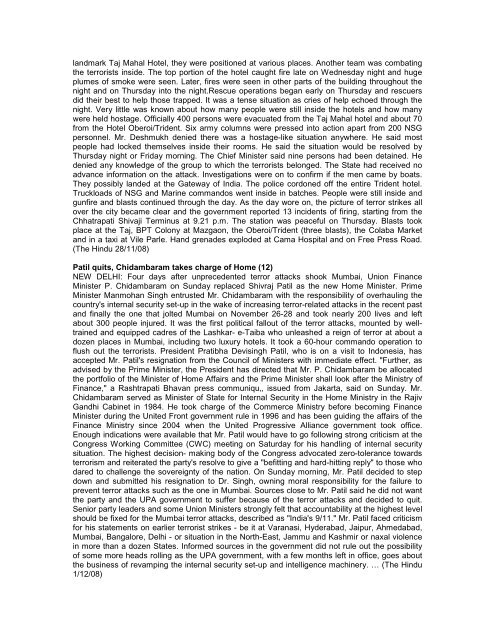TERRORISM - 2008 - Indian Social Institute
TERRORISM - 2008 - Indian Social Institute
TERRORISM - 2008 - Indian Social Institute
Create successful ePaper yourself
Turn your PDF publications into a flip-book with our unique Google optimized e-Paper software.
landmark Taj Mahal Hotel, they were positioned at various places. Another team was combating<br />
the terrorists inside. The top portion of the hotel caught fire late on Wednesday night and huge<br />
plumes of smoke were seen. Later, fires were seen in other parts of the building throughout the<br />
night and on Thursday into the night.Rescue operations began early on Thursday and rescuers<br />
did their best to help those trapped. It was a tense situation as cries of help echoed through the<br />
night. Very little was known about how many people were still inside the hotels and how many<br />
were held hostage. Officially 400 persons were evacuated from the Taj Mahal hotel and about 70<br />
from the Hotel Oberoi/Trident. Six army columns were pressed into action apart from 200 NSG<br />
personnel. Mr. Deshmukh denied there was a hostage-like situation anywhere. He said most<br />
people had locked themselves inside their rooms. He said the situation would be resolved by<br />
Thursday night or Friday morning. The Chief Minister said nine persons had been detained. He<br />
denied any knowledge of the group to which the terrorists belonged. The State had received no<br />
advance information on the attack. Investigations were on to confirm if the men came by boats.<br />
They possibly landed at the Gateway of India. The police cordoned off the entire Trident hotel.<br />
Truckloads of NSG and Marine commandos went inside in batches. People were still inside and<br />
gunfire and blasts continued through the day. As the day wore on, the picture of terror strikes all<br />
over the city became clear and the government reported 13 incidents of firing, starting from the<br />
Chhatrapati Shivaji Terminus at 9.21 p.m. The station was peaceful on Thursday. Blasts took<br />
place at the Taj, BPT Colony at Mazgaon, the Oberoi/Trident (three blasts), the Colaba Market<br />
and in a taxi at Vile Parle. Hand grenades exploded at Cama Hospital and on Free Press Road.<br />
(The Hindu 28/11/08)<br />
Patil quits, Chidambaram takes charge of Home (12)<br />
NEW DELHI: Four days after unprecedented terror attacks shook Mumbai, Union Finance<br />
Minister P. Chidambaram on Sunday replaced Shivraj Patil as the new Home Minister. Prime<br />
Minister Manmohan Singh entrusted Mr. Chidambaram with the responsibility of overhauling the<br />
country's internal security set-up in the wake of increasing terror-related attacks in the recent past<br />
and finally the one that jolted Mumbai on November 26-28 and took nearly 200 lives and left<br />
about 300 people injured. It was the first political fallout of the terror attacks, mounted by welltrained<br />
and equipped cadres of the Lashkar- e-Taiba who unleashed a reign of terror at about a<br />
dozen places in Mumbai, including two luxury hotels. It took a 60-hour commando operation to<br />
flush out the terrorists. President Pratibha Devisingh Patil, who is on a visit to Indonesia, has<br />
accepted Mr. Patil's resignation from the Council of Ministers with immediate effect. "Further, as<br />
advised by the Prime Minister, the President has directed that Mr. P. Chidambaram be allocated<br />
the portfolio of the Minister of Home Affairs and the Prime Minister shall look after the Ministry of<br />
Finance," a Rashtrapati Bhavan press communiqu‚, issued from Jakarta, said on Sunday. Mr.<br />
Chidambaram served as Minister of State for Internal Security in the Home Ministry in the Rajiv<br />
Gandhi Cabinet in 1984. He took charge of the Commerce Ministry before becoming Finance<br />
Minister during the United Front government rule in 1996 and has been guiding the affairs of the<br />
Finance Ministry since 2004 when the United Progressive Alliance government took office.<br />
Enough indications were available that Mr. Patil would have to go following strong criticism at the<br />
Congress Working Committee (CWC) meeting on Saturday for his handling of internal security<br />
situation. The highest decision- making body of the Congress advocated zero-tolerance towards<br />
terrorism and reiterated the party's resolve to give a "befitting and hard-hitting reply" to those who<br />
dared to challenge the sovereignty of the nation. On Sunday morning, Mr. Patil decided to step<br />
down and submitted his resignation to Dr. Singh, owning moral responsibility for the failure to<br />
prevent terror attacks such as the one in Mumbai. Sources close to Mr. Patil said he did not want<br />
the party and the UPA government to suffer because of the terror attacks and decided to quit.<br />
Senior party leaders and some Union Ministers strongly felt that accountability at the highest level<br />
should be fixed for the Mumbai terror attacks, described as "India's 9/11." Mr. Patil faced criticism<br />
for his statements on earlier terrorist strikes - be it at Varanasi, Hyderabad, Jaipur, Ahmedabad,<br />
Mumbai, Bangalore, Delhi - or situation in the North-East, Jammu and Kashmir or naxal violence<br />
in more than a dozen States. Informed sources in the government did not rule out the possibility<br />
of some more heads rolling as the UPA government, with a few months left in office, goes about<br />
the business of revamping the internal security set-up and intelligence machinery. … (The Hindu<br />
1/12/08)

















